Unlocking the secret to flourishing sales in the consulting world can feel like finding a needle in a haystack. But fear not, dear readers, for we’ll delve into sales funnels and discover their remarkable power.
If you’ve ever wondered how top consultants generate massive revenue streams, you’re lucky. A well-designed sales funnel can be a game-changer for consultants looking to attract and convert clients consistently.
Fortunately, in this blog post, we’ll explore the ins and outs of creating a consulting sales funnel and answer the burning question in every aspiring consultant’s mind: How much does it cost to make a consulting sales funnel?
So grab your calculators and prepare to be amazed as we unveil the secrets behind building an effective and affordable consulting sales funnel.
Let’s dive in!
Table of Contents
Overview Of A Consulting Sales Funnel
A consulting sales funnel is a strategic framework that guides potential clients through each stage of the buying process, from awareness to conversion. It includes various components such as lead generation, lead nurturing, and conversion optimization. Each stage is carefully crafted to deliver value, build trust, and convert prospects into paying clients.
The Importance Of A Well-Designed Sales Funnel
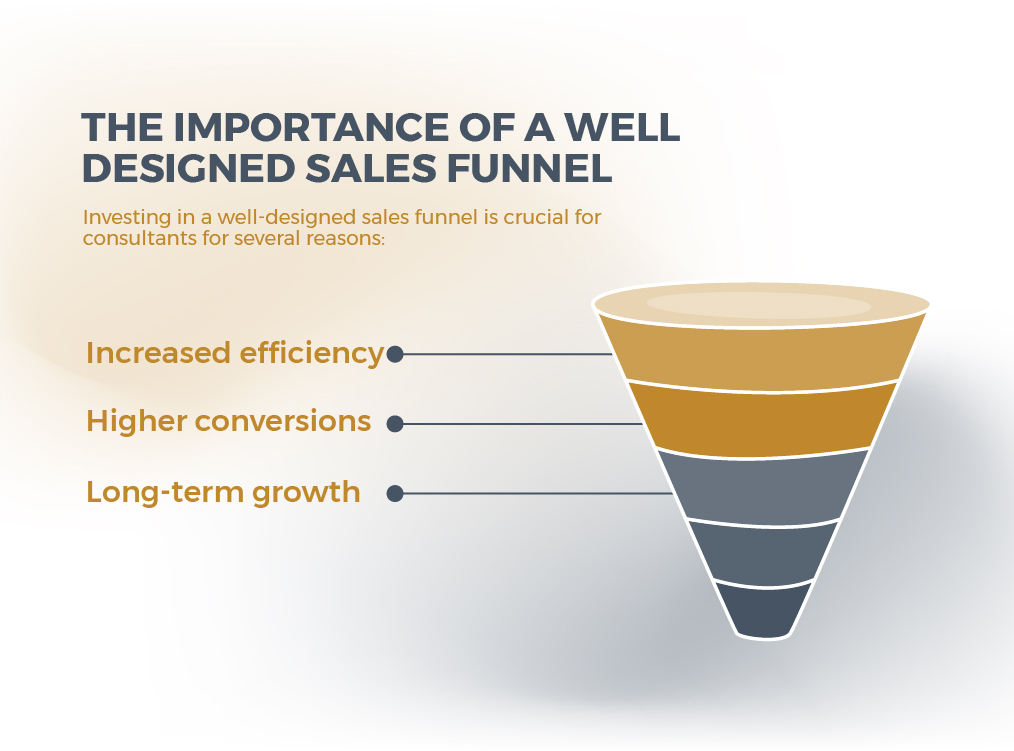
Investing in a well-designed sales funnel is crucial for consultants for several reasons:
- Increased efficiency: A well-structured funnel streamlines the customer acquisition process. It allows consultants to focus their time and resources on highly qualified leads.
- Higher conversions: To ensure a higher conversion rate of prospects to paying clients, consultants must provide top-notch resources, maintain constant communication, and proactively address any concerns.
- Long-term growth: A sales funnel expert provides a predictable and scalable system for attracting and converting clients. It ensures consistent revenue and growth for a consulting business.
To build a profitable sales funnel, analyze your target audience, offer valuable information, build trust, and guide them toward conversion.
Done For You Sales Funnel: What Does It Mean?
A “done for you” sales funnel is a marketing service or product offered by professionals or companies that involves creating and setting up a complete sales funnel on your behalf. This means you don’t have to handle the technical aspects, design, or content creation; instead, experts handle everything related to the sales funnel.
Here’s what “done for you” typically includes in a sales funnel context:
- Funnel Design: Professionals design the layout and structure of the sales funnel. It includes landing pages, opt-in forms, sales, and thank-you pages.
- Content Creation: They create or provide content for each funnel stage, including written copy, graphics, videos, and lead magnets (e.g., ebooks webinars) to attract and engage potential customers.
- Integration: They set up all the necessary integrations and automation tools to ensure the smooth flow of leads through the funnel, including email marketing software, payment processors, and analytics.
- Testing and Optimization: Experts often conduct A/B testing and continuously optimize the funnel to improve its lead generation and conversion performance.
- Launch and Monitoring: They launch the funnel and monitor its performance, adjusting as needed to achieve your marketing goals.
- Ongoing Maintenance: Some “done for you” services also include ongoing maintenance, where they manage email campaigns, update content, and ensure that the funnel remains effective.
The primary advantage of a “done for you” sales funnel is that it saves you time and effort, allowing you to focus on other aspects of your business while professionals handle the marketing funnel.
Masters Edge Dual Funnel System Cost
The Masters’ Edge Dual Funnel System is a highly effective sales funnel strategy designed explicitly for consulting businesses. It combines the power of two separate funnels to generate massive sales and maximize profits. But what exactly does it cost to implement this system?
The cost of setting up the Masters Edge Dual Funnel System can vary depending on various factors. Here, we’ll discuss the details.
- Unique business model: The cost of implementing the Masters’ Edge Dual Funnel System varies significantly based on your unique business model. Different consulting businesses have different complexities, which can influence the overall cost.
- Tailoring to Target Audience: Understanding your target audience is crucial in determining the cost. Tailoring your funnel to a specific audience might require additional resources, affecting the budget.
- Meeting Desired Outcomes: Your desired outcomes also affect the cost. If you aim for high sales volume and rapid growth, you may need a more comprehensive and expensive funnel setup than businesses with different goals.
- Varied Expenses: The cost of implementing this system is variable and depends on several factors unique to your business.
- Landing Pages and Lead Magnets: You’ll need exciting landing pages and lead magnets. These are essential for attracting potential clients to your funnel. You might hire a web developer or utilize user-friendly software like ClickFunnels or Lead Pages.
- Generating Traffic: Driving traffic to your funnel is another significant cost factor. This can involve running paid advertising campaigns on platforms like Facebook or Google Ads. Alternatively, you can opt for organic strategies like content creation and search engine optimization (SEO).
- Email Marketing Automation: Investing in email marketing automation software is essential to nurture leads effectively. Platforms such as Mailchimp or Convert Kit offer affordable plans tailored for small businesses.
- Maintenance and Optimization: Maintenance costs include monitoring analytics data, optimizing your funnel’s performance, and making necessary adjustments over time.
How To Create A Sales Funnel For Free?
Are you a consultant looking to streamline your sales process and attract more clients? Then, you need a well-designed and effective sales funnel to guide potential clients through the buyer’s journey.
Here are the key steps to creating a consulting sales funnel for free:
Step 1: Define your target audience and niche
Start by identifying your ideal client and understanding their pain points. This will help you tailor your messaging and offers to attract the right prospects.
Step 2: Develop a compelling offer and lead magnet
Create a valuable resource, such as an e-book, checklist, or webinar, that addresses your target audience’s problem. Offer this as a free download in exchange for their contact information.
Step 3: Design an effective landing page
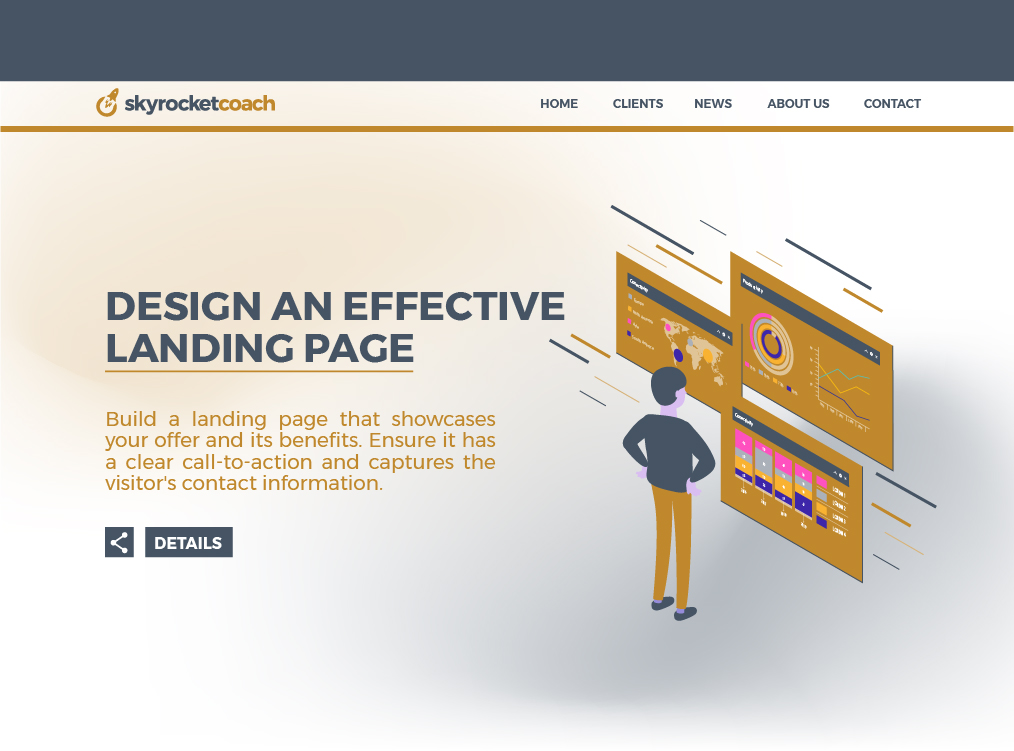
Build a landing page that showcases your offer and its benefits. Ensure it has a clear call-to-action and captures the visitor’s contact information.
Step 4: Nurture leads with an email sequence
Send automated emails to your leads, providing them valuable content and building trust. Include calls to action that drive them to take the next step in the buyer’s journey.
Step 5: Convert leads into paying clients with a sales page
Create a persuasive sales page that outlines your consulting services, showcasing their value and benefits. Make it easy for leads to schedule a consultation or take advantage of an introductory offer.
Step 6: Implement tracking and analytics
Use analytics tools to track the performance of each step in your sales funnel. This data will help you identify areas for improvement and optimize your funnel for better results.
By following these steps, you can create a powerful consulting sales funnel that attracts, nurtures, and converts leads into paying clients, ultimately growing your consulting business.
Cost Factors In Creating A Consulting Sales Funnel
There are several cost factors to consider when building a consulting sales funnel. Here are the key points to keep in mind:
Cost Of Hiring A Marketing Freelancer
- Entry-Level Freelancer: An entry-level freelance sales funnel specialist may charge anywhere from $25 to $50 per hour. These freelancers often start their careers and may have limited experience but can handle basic funnel tasks.
- Mid-Level Freelancer: A mid-level freelancer with a few years of experience might charge between $50 and $100 per hour. They can handle more complex funnel setups and strategies.
- Experienced Freelancer: Highly experienced freelancers can charge $100 to $200 per hour or more. They are experts in sales funnels and can create advanced, customized funnel systems tailored to your business needs.
- Project-Based Rates: Some freelancers may offer project-based pricing for specific funnel projects. Costs can range from a few hundred dollars for simple funnels to several thousand dollars for complete sales funnel setups, based on the project’s complexity.
Cost Of Hiring A Marketing Consultant Or Agency
- Small Marketing Agency: Small marketing agencies typically charge monthly retainer fees ranging from $1,000 to $5,000 or more. It depends on the services included. This fee may cover funnel creation, optimization, and ongoing management.
- Medium-Sized Agency: Medium-sized agencies may charge monthly retainer fees ranging from $5,000 to $10,000. They often offer a more comprehensive range of services, including funnel design, content creation, email marketing, and advertising.
- Large Agency: Large marketing agencies can charge monthly retainer fees exceeding $10,000. These agencies have extensive resources and can handle complex multi-channel funnel strategies for larger businesses.
- Project-Based Rates: Some agencies may offer project-based pricing for specific sales funnel projects. The cost can vary widely depending on the project’s scope, from a few thousand dollars to tens of thousands for larger and more complex funnels.
The Expense Of Creating A Professional Website And Landing Page
A professional website and landing page are essential to a successful consulting sales funnel. These platforms provide a place for potential clients to learn more about your services and take action by providing their contact information.
The expense of creating a high-quality website and landing page will depend on factors such as design complexity, functionality, and whether you choose to hire a professional web designer or use a DIY platform.
Investment In Lead Generation Tools And Software
Investing in lead generation tools and software is crucial for businesses looking to expand their customer base and boost revenue. Here’s an overview of some popular lead generation tools, including Involve.me, ClickFunnels, Kartra, GetResponse, ActiveCampaign, LeadPages, and Keap:
- Involve. me:
- Overview: Involve.me https://www.leadpages.com/is an interactive content platform that allows businesses to create engaging quizzes, surveys, and forms. It’s designed to capture leads through interactive and personalized content.
- Key Features: Interactive content creation, lead capture forms, integration with various marketing tools, analytics, and reporting.
- Use Case: Ideal for businesses looking to engage and capture leads through interactive content experiences.
- Click Funnels:
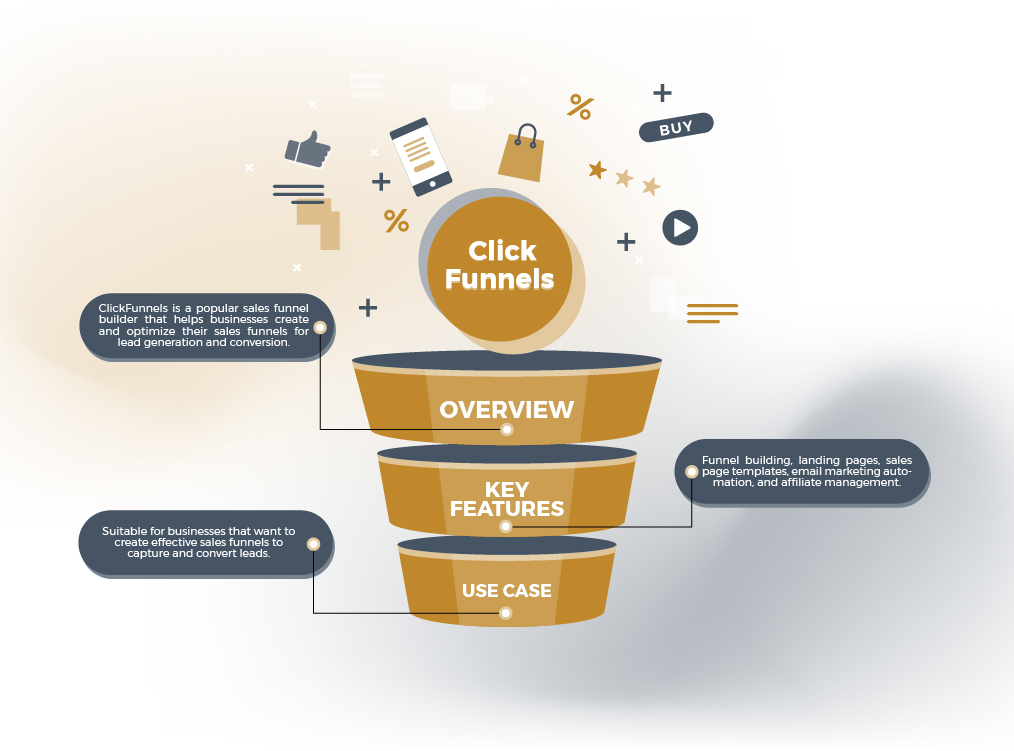
- Overview: ClickFunnels is a popular sales funnel builder that helps businesses create and optimize their sales funnels for lead generation and conversion.
- Key Features: Funnel building, landing pages, sales page templates, email marketing automation, and affiliate management.
- Use Case: Suitable for businesses that want to create effective sales funnels to capture and convert leads.
- Kartra:
- Overview: Kartra is an all-in-one marketing automation platform that includes features for lead generation, email marketing, funnel building, and more.
- Key Features: Landing pages, email marketing automation, membership sites, affiliate management, and analytics.
- Use Case: Ideal for businesses looking for a comprehensive marketing solution to generate and nurture leads.
- GetResponse:
- Overview: GetResponse is an email marketing and marketing automation platform with lead generation features like landing page creation and webinars.
- Key Features: Email marketing, landing pages, marketing automation, webinars, and CRM.
- Use Case: Suitable for businesses that prioritize email marketing and want to capture leads through landing pages and webinars.
- ActiveCampaign:
- Overview: ActiveCampaign is a versatile marketing automation platform with lead scoring, email marketing, and CRM features.
- Key Features: Email marketing automation, lead scoring, CRM integration, and marketing automation workflows.
- Use Case: Businesses looking for advanced lead scoring and automation capabilities.
- LeadPages:
- Overview: LeadPages is a landing page builder specializing in creating high-converting landing pages to capture leads.
- Key Features: Landing page builder, lead capture forms, A/B testing, and integration with email marketing tools.
- Use Case: Perfect for businesses that create effective landing pages for lead generation.
- Keap (formerly Infusionsoft):
- Overview: Keap is a CRM and marketing automation platform that helps businesses with lead capture, nurturing, and conversion.
- Key Features: CRM, email marketing automation, lead scoring, and e-commerce integration.
- Use Case: Ideal for businesses that need a CRM-centric approach to lead generation and management.
These tools can help you capture and manage leads, automate follow-ups, and track the performance of your sales funnel. The cost will vary depending on the specific tools and software you choose and any ongoing subscription or licensing fees.
Note: It’s essential to carefully consider these expenses and their potential return on investment to ensure the success of your sales funnel.
DIY Vs. Hiring A Professional: Which Is More Cost-Effective? Pros And Cons
Pros Of Building A Sales Funnel Yourself
If you’re wondering whether to create your own consulting sales funnel or outsource it to experts, here are some benefits of the do-it-yourself approach:
- Budget-friendly: Building a sales funnel yourself can save you money, especially if you have a limited budget. You can use free or low-cost tools and resources to create an effective funnel without breaking the bank.
- Hands-on control: By building your sales funnel, you have complete control over the design, messaging, and overall strategy. You can adapt and make changes quickly based on your specific needs and goals.
Benefits Of Hiring A Professional
- Expertise and experience: Hiring consultants or agencies with expertise in creating sales funnels can save you time and effort. We have the skills and knowledge to design and optimize a high-converting funnel that aligns with your business goals.
- Access to advanced tools and technology: Outsourcing to experts gives you access to industry-leading tools and technology that can enhance the performance of your sales funnel. This includes advanced analytics, automation software, and customer relationship management (CRM) systems.
- Saves time: Building a sales funnel from scratch requires significant time and effort. By outsourcing, you can focus on other core aspects of your business while professionals handle the funnel creation process.
Ultimately, deciding between DIY and outsourcing depends on your budget, resources, and expertise. Consider these pros and cons to determine the best approach for your consulting business.
What’s The Difference Between Cheaper And More Expensive Sales Funnel Costs?
The price of a sales funnel can vary a lot based on many things. Usually, the level of complexity, customization, and effectiveness you want to achieve determines the price range. These are some crucial differences:
1. Customization and Complexity:
- Cheaper funnels often use templates or pre-built designs not highly customized to your business needs. They are typically simpler and easier to set up but may not be as tailored to your audience or product.
- More expensive funnels often involve custom design, content creation, and strategic planning. They are highly tailored to your target audience and product, leading to better conversion rates and a more personalized user experience.
2. Tools and Technology:
- Cheaper sales funnels may rely on free or low-cost tools and software for creating landing pages, email marketing, and automation. These tools may have limitations in terms of functionality.
- More expensive funnels often use premium or custom-built tools and technologies. They can provide more robust features, analytics, and integrations to optimize the sales process.
3. Content Quality:
- Cheaper funnels may use stock images and generic copy, which may not resonate well with your audience.
- More expensive funnels often invest in high-quality content, such as professional copywriting, graphic design, and video production, to make the funnel more engaging and persuasive.
4. A/B Testing and Optimization:
- Cheaper funnels might not allocate resources for extensive A/B testing and optimization. So, they may not perform as efficiently regarding conversion rates.
- More expensive funnels often include ongoing testing and optimization efforts to maximize their effectiveness and improve the return on investment.
5. Traffic Sources:
- Cheaper funnels may rely on low-cost or free traffic sources, which may not yield the same quality or quantity of leads and customers.
- More expensive funnels can incorporate paid advertising, influencer partnerships, and other strategies to drive high-quality traffic and increase conversions.
6.Tracking and Analytics:
- Cheaper funnels use basic tracking tools, which may not provide in-depth insights into the customer journey and funnel performance.
- More expensive funnels often invest in advanced analytics tools and reporting systems to understand customer behavior better and make data-driven improvements.
7. Support and Maintenance:
- Cheaper funnels may lack ongoing support or maintenance, leaving you responsible for troubleshooting and updating the funnel.
- More expensive funnels often come with ongoing support and maintenance, ensuring that the funnel remains optimized and functional.
- Which one you choose will rely on your business goals, your budget, and the level of complexity you need to reach your sales and marketing goals.
Case Study: Sample Budget Breakdown
Are you considering creating a consulting sales funnel for your business? If so, you’re probably wondering about the costs involved. The good news is that it doesn’t have to break the bank. By carefully planning and budgeting, you can create an effective sales funnel that fits your budget and generates results.
Case Studies: Successful Consulting Sales Funnels and Their Costs
Case Study 1: ABC Consulting
ABC Consulting, a leading firm in the industry, invested $10,000 to set up its sales funnel. They hired a professional marketing agency to design and build their funnel from scratch. This investment paid off, as they saw a significant increase in leads and conversions within just three months of launching their new funnel.
Case Study 2: XYZ Solutions
XYZ Solutions, a smaller consulting firm with limited resources, took the DIY approach to create its sales funnel. They used affordable tools like Click funnels and spent around $500 on graphic design services. While their initial investment was lower than ABC Consulting, they achieved impressive results with increased lead generation and client acquisition.
Breakdown Of Costs For A Consulting Sales Funnel
To help you understand the potential costs involved in creating a consulting sales funnel, here is a breakdown of the key steps and their estimated costs:
Cost Estimation For Each Step
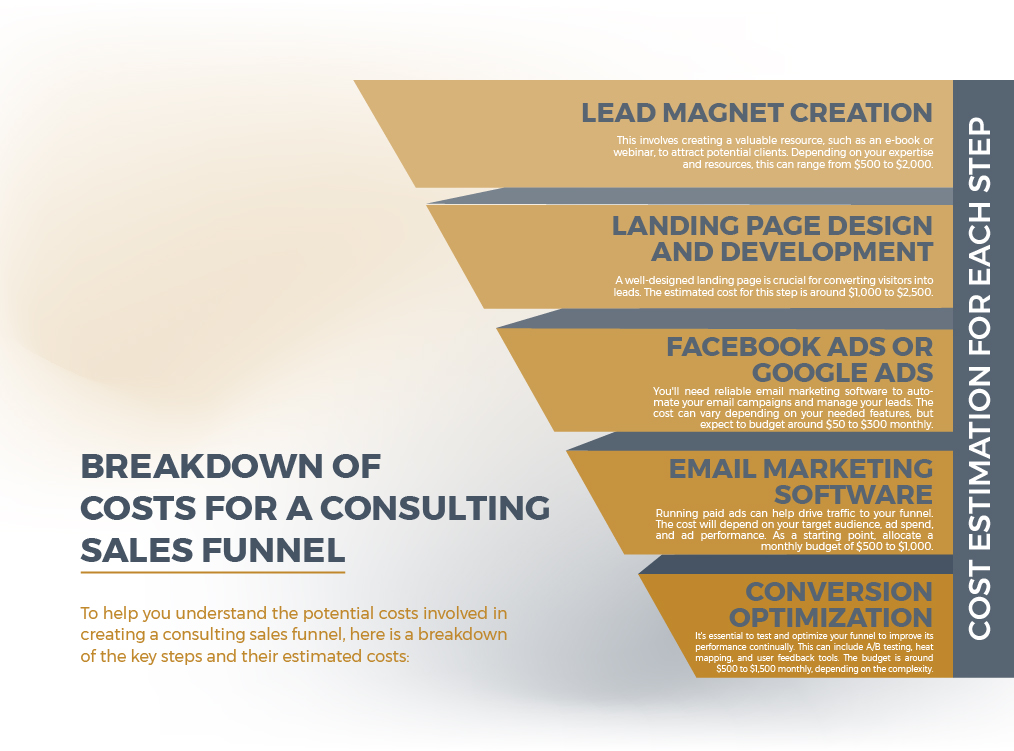
- Lead Magnet Creation: This involves creating a valuable resource, such as an e-book or webinar, to attract potential clients. Depending on your expertise and resources, this can range from $500 to $2,000.
- Landing Page Design and Development: A well-designed landing page is crucial for converting visitors into leads. The estimated cost for this step is around $1,000 to $2,500.
- Email Marketing Software: You’ll need reliable email marketing software to automate your email campaigns and manage your leads. The cost can vary depending on your needed features, but expect to budget around $50 to $300 monthly.
- Facebook Ads or Google Ads: Running paid ads can help drive traffic to your funnel. The cost will depend on your target audience, ad spend, and ad performance. As a starting point, allocate a monthly budget of $500 to $1,000.
- Conversion Optimization: It’s essential to test and optimize your funnel to improve its performance continually. This can include A/B testing, heat mapping, and user feedback tools. The budget is around $500 to $1,500 monthly, depending on the complexity.
Remember, the abovementioned costs are estimates and can vary based on your requirements and resources. It’s important to carefully plan and allocate your budget to ensure the success of your consulting sales funnel.
Tips For Cost-Effective Sales Funnel Development
Creating an effective sales funnel is crucial for converting leads into paying customers. However, the cost of developing a sales funnel can vary depending on various factors. Here are some tips to help you save money without compromising the quality of your sales funnel and strategies for maximizing your return on investment (ROI).
Ways To Save Money Without Compromising Quality
- Simplify your sales funnel: Focus on the essential steps and remove unnecessary complexity. This will save you time and reduce the costs of designing and implementing a complex funnel.
- Utilize automation tools: Take advantage of technology and use
automation tools to streamline your sales funnel processes. These tools can save time and money by automating repetitive tasks and improving efficiency.
Strategies For Maximizing Roi
- Target the right audience: Properly identify your target audience and craft tailored messages that resonate with them. By focusing your efforts on the right people, you can increase your chances of converting leads into customers and maximize your ROI.
- Track and analyze your metrics: Regularly monitor and analyze the key metrics of your sales funnel, such as conversion rates and customer acquisition costs. This data will help you identify areas for improvement and optimize your funnel for better results.
Note: Remember, developing a sales funnel is an ongoing process. Continuously test and refine your strategies to ensure the best possible outcomes while keeping the costs in check.
What Is The Average Cost Of Creating A Sales Funnel For A Product Or Service?

The average cost of creating a sales funnel for a product or service can vary widely depending on several factors, including the complexity of the funnel, the industry, the target audience, and the specific goals of your marketing campaign. However, we can provide you with a rough estimate to give you an idea of what to expect:
- Basic Sales Funnel: For a simple sales funnel with a few landing pages, lead magnets, and email automation, you might expect to pay anywhere from $1,000 to $5,000. A freelance funnel specialist or a small agency would typically handle this.
- Intermediate Sales Funnel: If you need a more comprehensive sales funnel that includes multiple steps, A/B testing, and more advanced email marketing automation, the cost could range from $5,000 to $10,000 or more. This might involve working with a mid-sized agency or an experienced freelancer.
- Advanced Sales Funnel: For highly complex sales funnels, especially in competitive industries or for high-value products/services, the cost can go well beyond $10,000. Large marketing agencies or specialized funnel experts may be involved in creating and managing such funnels.
- Ongoing Management: Remember that creating the sales funnel is just the beginning. Ongoing management, optimization, and maintenance will also incur costs. Monthly retainers can range from a few hundred dollars to several thousand dollars, depending on the scope of services and the expertise required.
- Advertising Costs: Additionally, you should factor in advertising costs if you plan to run paid ad campaigns to drive traffic to your funnel. Advertising budgets vary significantly based on your industry, audience, and goals.
Remember that a well-designed and effectively managed sales funnel can provide a substantial return on investment by driving leads and conversions for your product or service.
Final Words
Hopefully, you understand how much does it cost to make a consulting sales funnel. In today’s competitive consulting industry, having a well-designed sales funnel can be the key to success. It helps attract and engage potential clients and guides them through buying.
While the cost of creating a consulting sales funnel may vary depending on factors such as complexity, customization, and whether to build it yourself or hire a professional, investing in a high-quality funnel is essential for long-term growth.
Building an effective sales funnel requires careful planning, strategic thinking, and continuous optimization. Understanding your target audience, their pain points, and how your services can address their needs is essential.
If you want to make a consulting sales funnel but don’t know where to begin or how much it will cost, talk to professionals like Skyrocket Coach, who always creates unique funnels for consultants. We’ve successfully helped numerous businesses achieve impressive results with our dual-funnel strategy.
Building a solid sales funnel can help you gain credibility in your specialized market and earn regular revenue. So don’t hesitate – take action today and start reaping the benefits of an efficient consulting sales funnel!
FAQs About How Much Does It Cost To Make A Consulting Sales Funnel
How do you create a landing page and sales funnel for your website?
Create a landing page using a tool like Leadpages or ClickFunnels. Connect it to your website and build a sales funnel by linking related pages that guide visitors toward a conversion goal.
Can a sales funnel truly be a better option than a traditional website?
Yes, a well-designed sales funnel can be more effective for targeted conversion goals than a traditional website. Funnels guide users through a specific journey, optimizing the chances of conversion.
What is the difference between the landing page & sales funnel?
A landing page is a single web page aimed at capturing leads. A sales funnel comprises multiple pages and email sequences, guiding leads through a structured process to conversion.
What is the difference between ClickFunnels and a sales funnel?
ClickFunnels is a software platform that helps create and manage sales funnels. A sales funnel is a strategic marketing process, while ClickFunnels is a tool to implement that process effectively.
Can You create a consulting sales funnel on a tight budget?
Yes, you can create a simple funnel for minimal cost using free or low-cost tools, DIY content creation, and limited advertising spending.

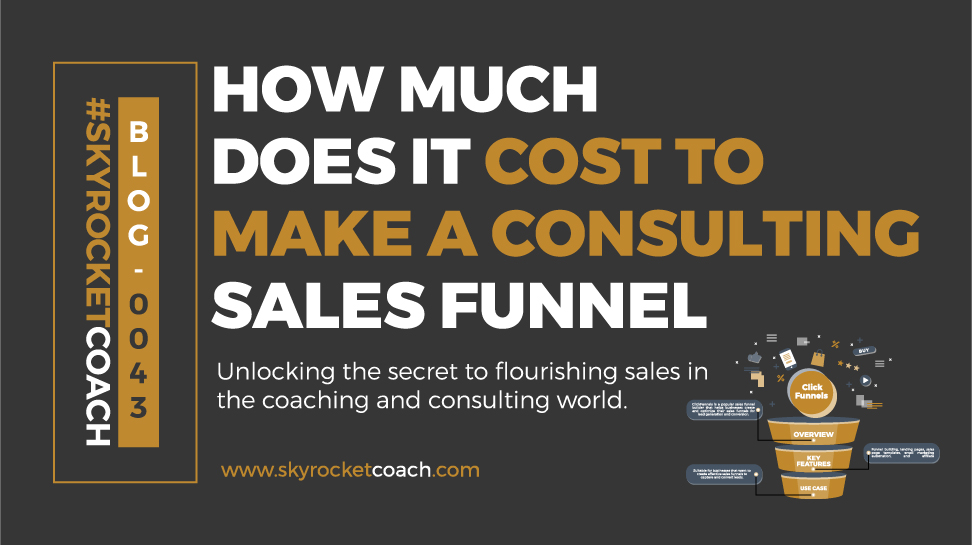
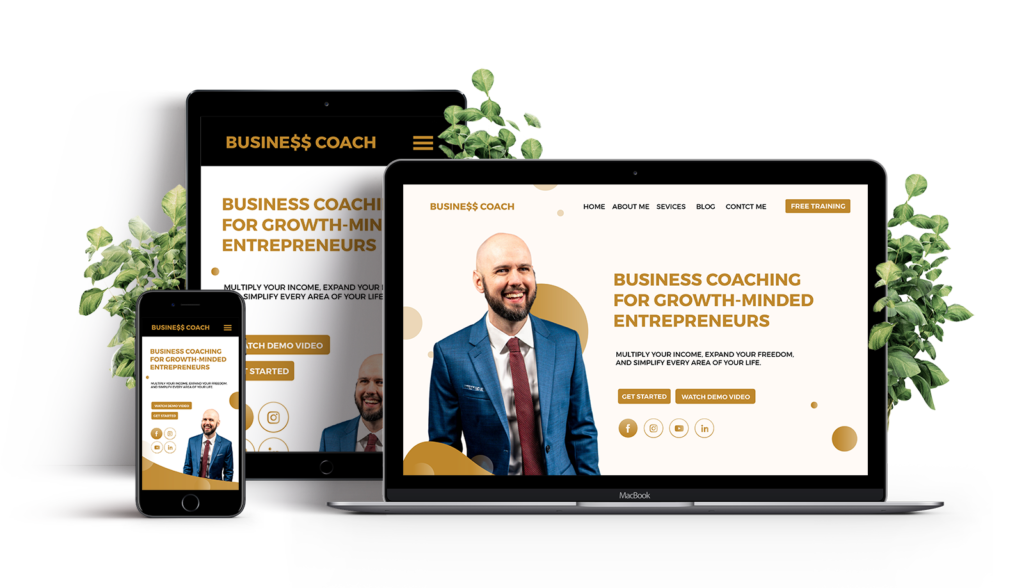
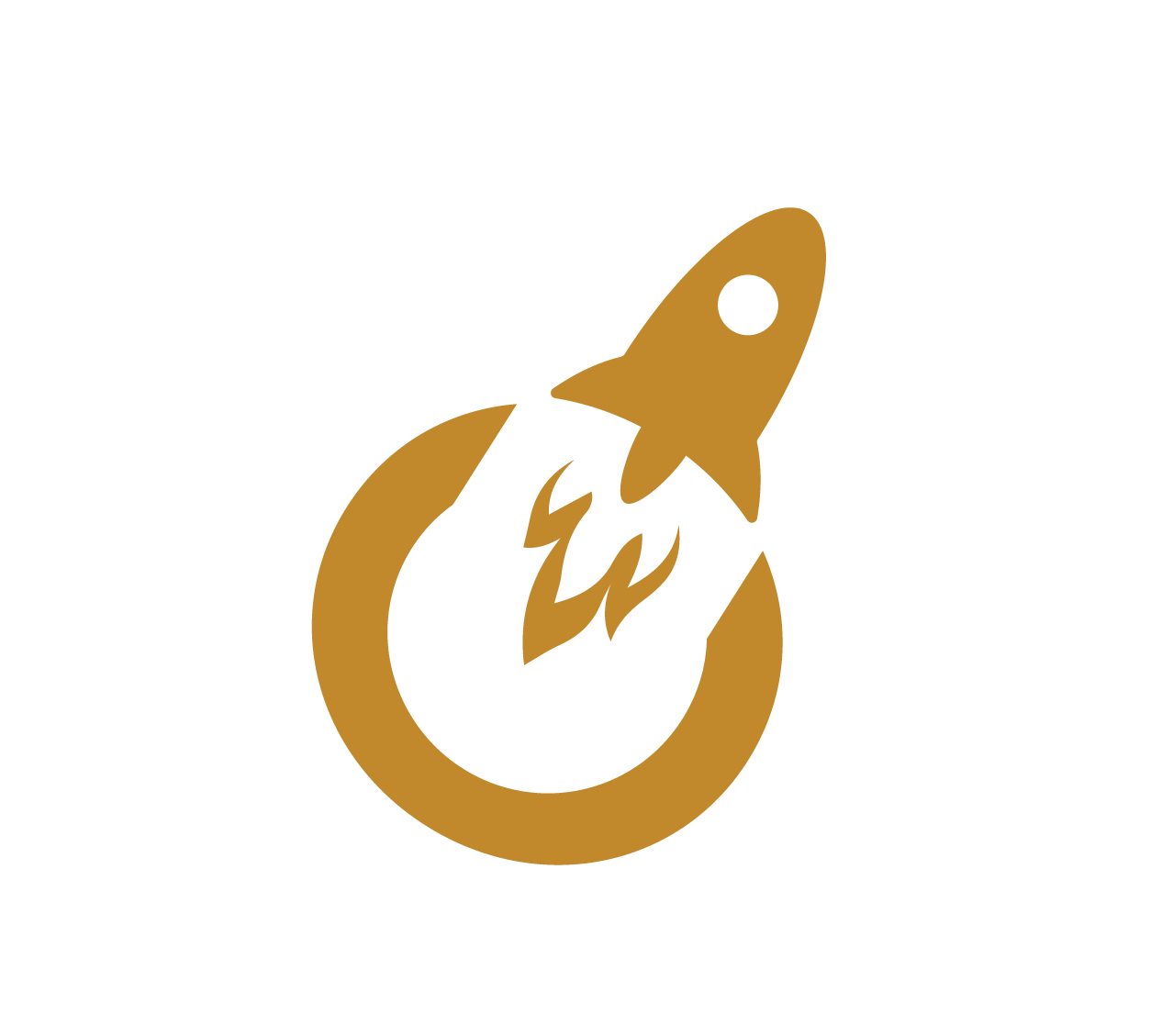
Recent Comments